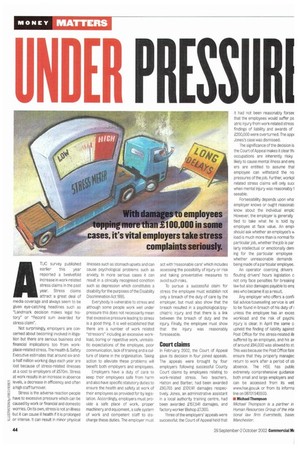Eli PRES SO R
Page 44

If you've noticed an error in this article please click here to report it so we can fix it.
With damages to employees g more than 2100,000 in some cases, it's vital employers take stres complaints seriousi
ATUC survey published
earlier this year reported a twelvefold increase in work-related stress claims in the past year. Stress claims attract a great deal of media coverage and always seem to be given eye-catching headlines such as "Landmark decision makes legal history" or "Record sum awarded for stress claim".
Not surprisingly, employers are concerned about becoming involved in litigation but there are serious business and financial implications too from workplace-related stress. The Health 8, Safety Executive estimates that around six-anda-half million working days each year are lost because of stress-related illnesses at a cost to employers of £570m. Stress at work resifts in an increase in absence levels, a decrease in efficiency and often a high staff turnover.
Stress is the adverse reaction people have to excessive pressure which can be caused by work or financial and domestic worries. On its own, stress is not an illness but it can cause ill health if it is prolonged or htense, it can result in minor physical illnesses such as stomach upsets and can cause psychological problems such as anxiety. In more serious cases it can result in a clinically recognised condition such as depression which constitutes a disability for the purposes of the Disability Discrimination Act 1995.
Everybody is vulnerable to stress and although some people work well under pressure this does not necessarily mean that excessive pressure leading to stress is a good thing. It is well established that there are a number of work related "stressors" including an excessive workload, boring or repetitive work, unrealistic expectations of the employee, poor communication, lack of training and a culture of blame in the organisation. Taking action to alleviate these problems will benefit both employers and employees.
Employers have a duty of care to keep their employees safe from harm and also have specific statutory duties to ensure the health and safety at work of their employees as provided for by legislation. Accordingly, employers must provide a safe place of work, proper machinery and equipment, a safe system of work and competent staff to discharge these duties. The employer must act with 'reasonable care' which includes assessing the possibility of injury or risk and taking preventative measures to avoid such risks.
To pursue a successful claim for stress the employee must establish not only a breach of the duty of care by the employer, but must also show that the breach resulted in a psychological/psychiatric injury and that there is a link between the breach of duty and the injury. Finally, the employee must show that the injury was reasonably foreseeable.
Court claims
In February 2002, the Court of Appeal gave its decision in four joined appeals. The appeals were brought by four employers following successful County Court claims by employees relating to work-related stress. Two teachers, Hatton and Barber, had been awarded 290,765 and £101,141 damages respectively, Jones, an administrative assistant in a local authority training centre, had been awarded 2157,541 damages, and factory worker Bishop £7,000.
Three of the employers' appeals were successful; the Court of Appeal held that it had not been reasonably forseE that the employees would suffer ps atric injury from work-related stress findings of liability and awards of £200,000 were overturned. The am( Jones's case was dismissed.
The significance of the decision is the Court of Appeal makes it clear th occupations are inherently risky likely to cause mental illness and emi ens are entitled to assume Mal employee can withstand the no pressures of the job. Further, workpl related stress claims will only sua when mental injury was reasonably I seeable.
Forseeability depends upon wha employer knows or ought reasonab know about the individual emplc However, the employer is generally tied to take what he is told by employee at face value. An empl, should ask whether an employee's % load is much more than is normal for particular job, whether the job is par lady intellectual or emotionally dem ing for the particular employee whether unreasonable demands being made of a particular employee.
An operator coercing drivers flouting drivers' hours legislation c not only face penalties for breaking law but also damages payable to emr ees who became ill as a result.
Any employer who offers a confil tial advice/counselling service is unl to be found in breach of his duty of ( unless the employee has an exces workload and the risk of psychii injury is clear. In April the same o upheld the finding of liability against Post Office for the stress-related ilk suffered by an employee, and his av of around £94,000 was allowed to st This was because the Post Office faitE ensure that they properly managec return to work after a period of sti absence. The HSE has publis extremely comprehensive guidance both small and large employers and can be accessed from its wet www.hse.gov.uk or from its informa line on 08701545500.
• Michael Thompson Michael Thompson is a partner in Human Resources Group of the inte tional law firm Eversheds, baser Manchester.
























































































































































